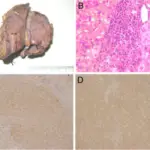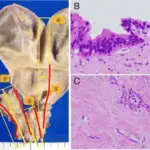Hepatocellular Adenomas are the benign neoplasm of hepatocellular origin arising in the noncirrhotic liver
What is the Pathology of Hepatocellular Adenomas?
The pathology of hepatocellular adenomas is:
-Etiology: The cause of hepatocellular adenomas is the use of estrogen-based oral contraceptive pills
-Genes involved: Unknown.
-Pathogenesis: The sequence of events that lead to hepatocellular adenomas include generalized vascular ectasia that develops due to exposure of the vasculature of the liver to oral contraceptives and related synthetic steroids.
-Histology: The histology associated with hepatocellular adenomas shows a well-defined border between the lesion and background liver, composed of hepatocytes with no significant cytologic atypia.
How does Hepatocellular Adenomas Present?
Patients with hepatocellular adenomas typically affect female present at the age range of 31-47 years. The symptoms, features, and clinical findings associated with hepatocellular adenomas include sudden abdominal pain, low blood pressure, and internal bleeding.
How is Hepatocellular Adenomas Diagnosed?
Hepatocellular adenomas is diagnosed through ultrasound, MRI, CT scan.
How is Hepatocellular Adenomas Treated?
Hepatocellular adenomas is treated using surgical excision and suspension of oral contraceptive pills.
What is the Prognosis of Hepatocellular Adenomas?
The prognosis of hepatocellular adenomas is good with mortality in elective cases being less than 1%.



